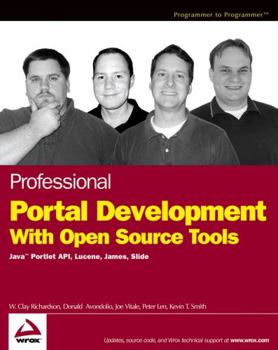Professional Portal Development with Open Source Tools: Java?portlet API, Lucene, James, Slide
What is this book about? Open source technology enables you to build customized enterprise portal frameworks with more flexibility and fewer limitations. This book explains the fundamentals of a powerful set of open source tools and shows you how to use them. An outstanding team of authors provides a complete tutorial and reference guide to Java Portlet API, Lucene, James, and Slide, taking you step-by-step through constructing and deploying portal...
Format:Paperback
Language:English
ISBN:0471469513
ISBN13:9780471469513
Release Date:February 2004
Publisher:Wrox Press
Length:456 Pages
Weight:1.55 lbs.
Dimensions:1.0" x 7.4" x 9.1"
Customer Reviews
4 ratings
Terrific Book, Reviews mis-leading! Bonus Chapter Rocks!
Published by Thriftbooks.com User , 19 years ago
This book covers JSR-168 portal development extremely well and provides developers with great insight about Open-Source technologies that are commonly used within portals. Some of the reviewers complaints are pretty odd and don't hold much weight once you actually read and use the book. The authors even went through the trouble of including a bonus chapter on Pluto which is located on the Wrox web site. The URL is: [...]
A pretty decent book
Published by Thriftbooks.com User , 20 years ago
This book is probably the most thorough portal book that has been published to date. Other books are filled with high-minded thoughts on how to build a portal but don't have relevant content on how portals should be developed in the real-world. I'm not saying that this book is perfect, i think that a finished portal product in the end with all of the components described in the book integrated into a portal application would have been nice, but the authors did a fine job of describing some important Open-source tools used in portlets and how these individual components can be "portlet-tized" for production. My guess is that the authors were constrained by the late release of JSR specification and the Open-source tools that incorporated them into a portal framework, which explains the bonus chapter that is posted on the Wrox website rather than being integrated into the book itself. The criticisms of this book range from exaggerated to imbecilic. The hyperbolic "cookbook" claims are somewhat accurate in that the book could of been better organized as a finished portal product, but idiotic when describing this book as failing to serve as a proper guide for organizing components for portal development. In the real-world, portals are supposed to provide a unified view of disparate components, which sounds like a lot of "different technologies" being placed in a stew, to say that a portal book being written in some other fashion is just plain stupid. I contend that the "finished product" is good, because the book introduces a potpourri of web technologies and describes quite sufficiently in the book and in their bonus chapter how to integrate web components into a JSR-168 compliant portlet for deployment. The imbecilic claims about the title misrepresenting the book contents concerning Jetspeed just tells me that the critic does not know how to read a book title, and the swipe about this book as an amalgamation of open-source tools without much content tells me that this person would probably prefer one of those "pea-brained" tomes with simplistic examples and mind-numbing API referrences...ugh. This book is chock full of examples of how a portal should be developed with excellent examples on how to build portlets. Chapter 7 has an great example of the implementation of dom4j for a portal content component that reads an XML taxonomy and renders links in a web application for easy navigation, which i currently use with a high profile customer portal implementation. Chapter 9 does a nice job of explaining how a simple web component can be wrapped in JSR-168 API's to create a standard portlet component that can be easily ported to the eXo platform. Lastly, Chapter 8 does a great job in describing how Javascript can be crafted to serve client-side needs for your portal deployments considering that not all processing needs to be performed on the backend. An important point to take away from this book is that not everyone needs to deploy their applicati
Excellent "soup to nuts" guide to portal development
Published by Thriftbooks.com User , 20 years ago
I have to agree with the other reviewers about how strong this book is, and how nice it is to find a book that covers JSR 168.The authors did a great job covering the whole portal development process. Here's the table of contents from my copy of the book:Part I: Open Source Portals. Chapter 1: The Java Portlet API (JSR 168). Chapter 2: Searching with Lucene. Chapter 3: Messaging with Apache James. Chapter 4: Object to Relational Mapping with Apache OJB. Chapter 5: Content Management with Jakarta's Slide. Chapter 6: Portal Security. Part II: How to Build a Portal. Chapter 7: Planning for Portal Deployment. Chapter 8: Effective Client-Side Development Using JavaScript. Chapter 9: Developing Applications and Workflow for Your Portal. Chapter 10: Portlet Integration with Web Services. Chapter 11: Performance Testing, Administering, and Monitoring Your Portal. Chapter 12: Unifying the Enterprise Application Space Through Web Start.
Great Book!
Published by Thriftbooks.com User , 20 years ago
I was pleasantly suprised to find a book on JSR 168 and even more surprised with the excellent content of this book. The authors explain what it takes to make your portal's portlets JSR 168 compliant and they also give you valuable examples with popular open source tools. Nicely done - I highly recommend this book!





